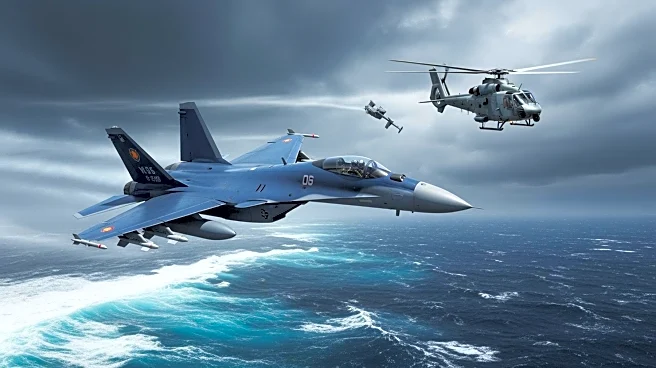What's Happening?
The U.S. Navy reported that a helicopter and a fighter jet, both operating from the USS Nimitz aircraft carrier, went down in the South China Sea during routine operations. The incidents occurred approximately
30 minutes apart, with the MH-60R Sea Hawk helicopter crashing at around 2:45 p.m. local time, followed by the F/A-18F Super Hornet fighter jet at 3:15 p.m. All crew members involved in both incidents were safely recovered and are in stable condition. The U.S. Pacific Fleet has initiated an investigation to determine the cause of these incidents.
Why It's Important?
These incidents highlight the operational risks associated with military exercises in contested regions like the South China Sea, a strategic area with ongoing territorial disputes. The safe recovery of all personnel underscores the effectiveness of emergency protocols but also raises concerns about equipment reliability and operational safety. The investigation's findings could impact future military operations and training exercises, potentially leading to changes in protocol or equipment usage. The incidents may also influence diplomatic relations, as military activities in the South China Sea are closely monitored by neighboring countries.
What's Next?
The U.S. Pacific Fleet's investigation will focus on identifying the technical or procedural failures that led to the incidents. Depending on the findings, there may be recommendations for changes in equipment maintenance, operational procedures, or training programs. The results could also affect the scheduling and scope of future exercises in the region. Additionally, the incidents may prompt discussions among U.S. military leaders and policymakers regarding the strategic approach to operations in the South China Sea.
Beyond the Headlines
The incidents could have broader implications for U.S. military strategy in the Asia-Pacific region. As the South China Sea remains a focal point for geopolitical tensions, the U.S. Navy's operations are critical for maintaining a presence and asserting freedom of navigation. The investigation's outcomes might influence the U.S.'s diplomatic stance and military readiness in the area, potentially affecting international relations and defense policies.










